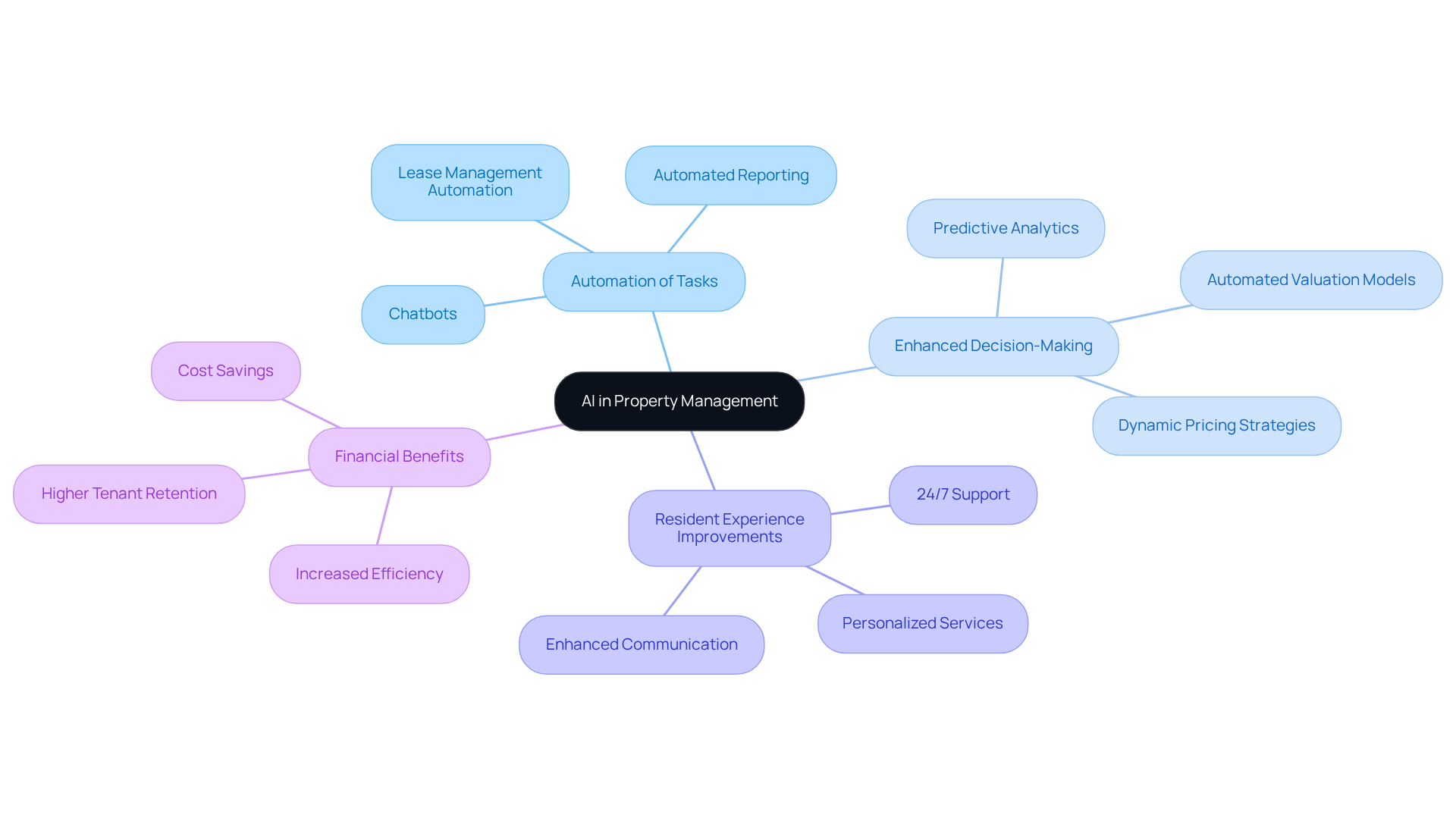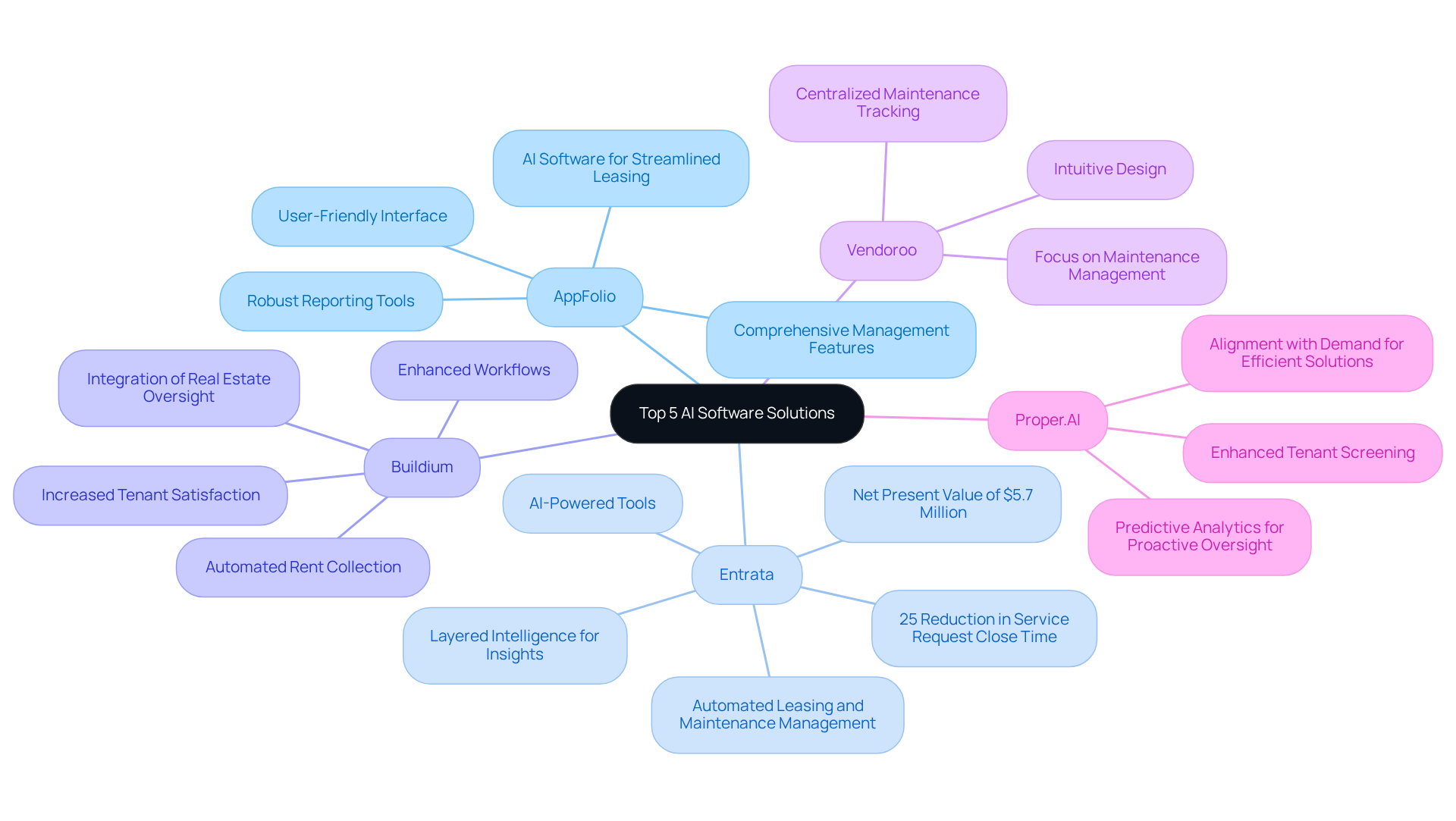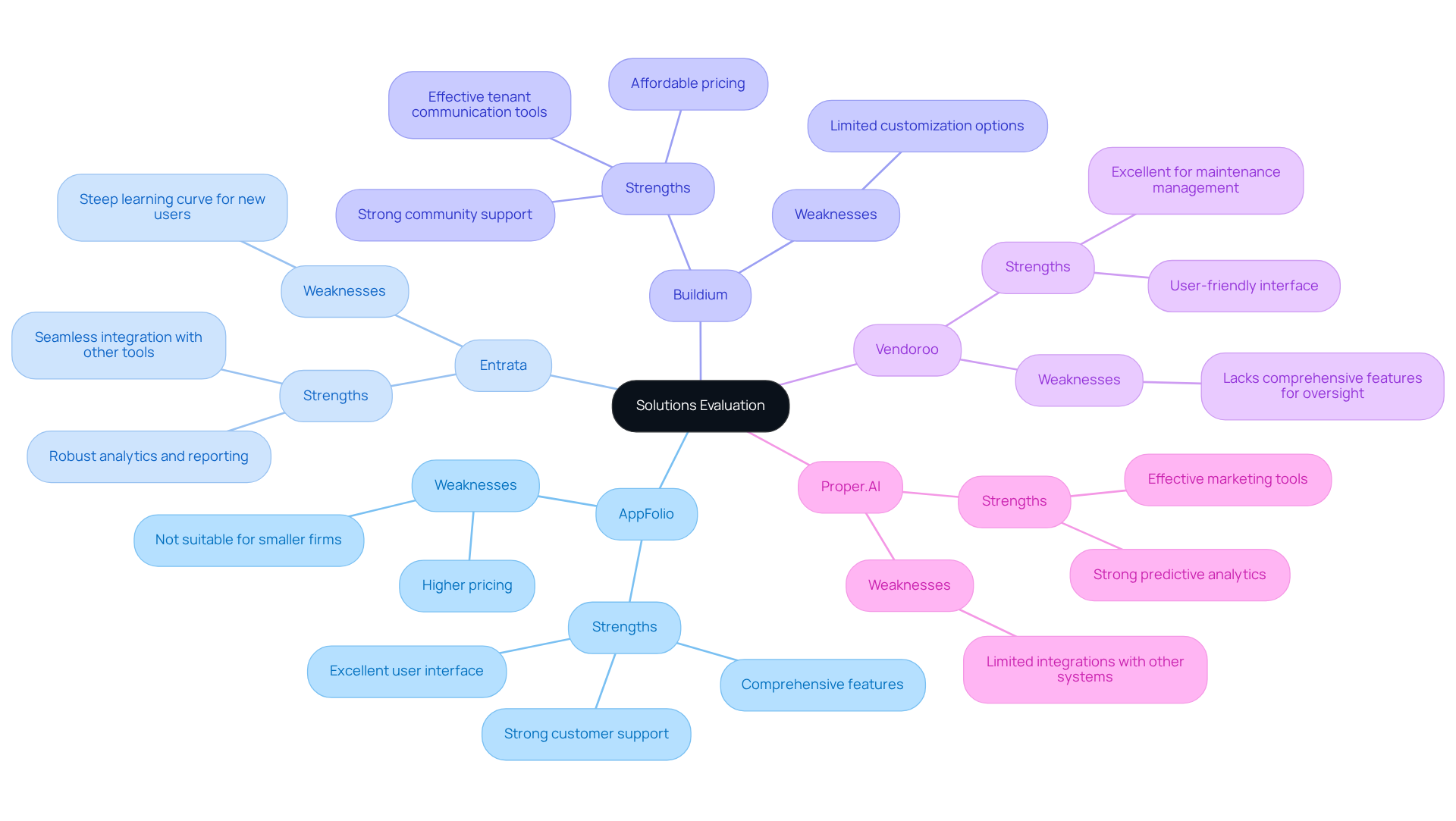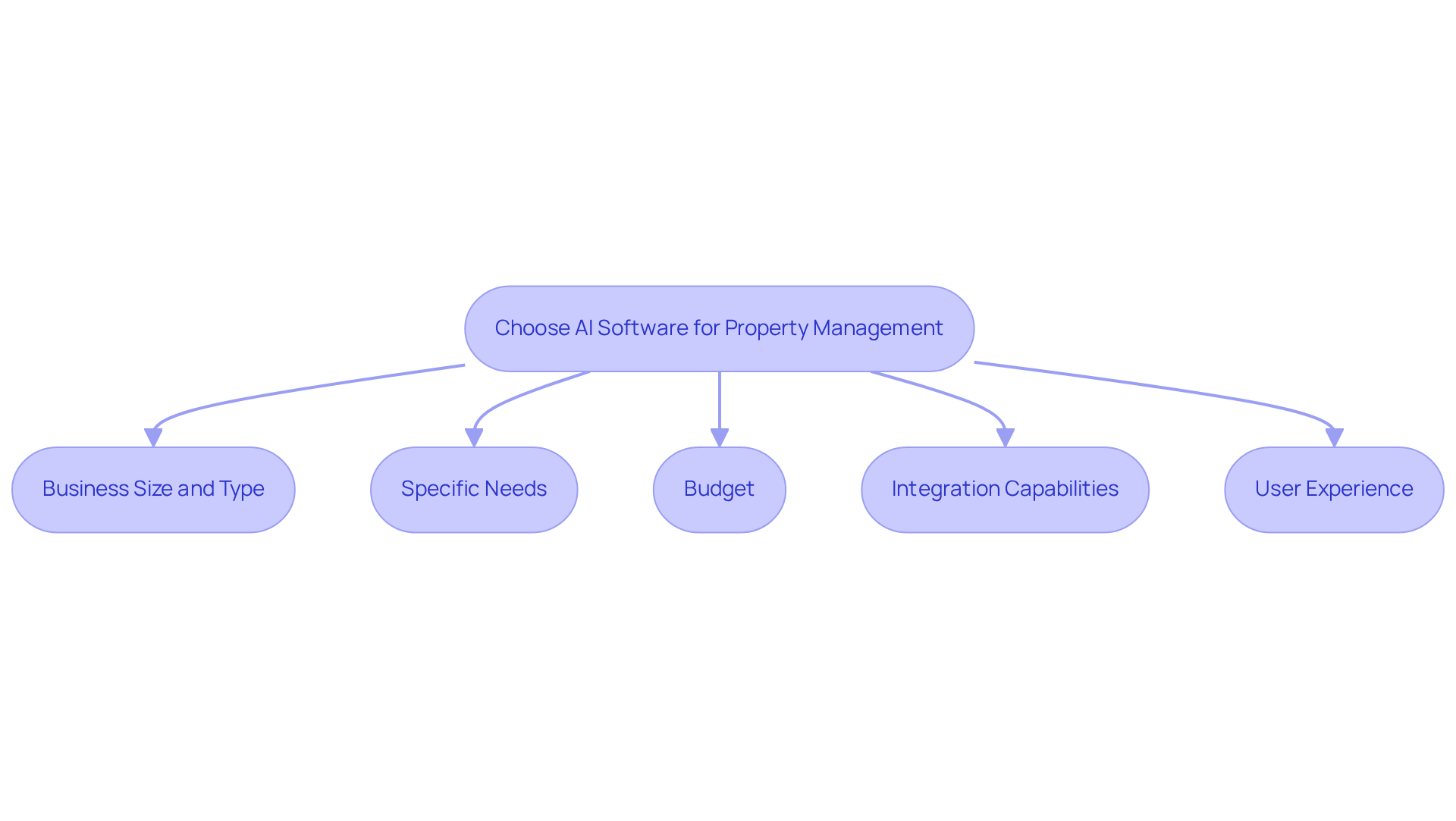Overview
This article provides a comprehensive comparison of five AI software solutions specifically designed for property management companies, emphasizing their distinct features and how they cater to various operational needs. The significance of leveraging advanced technology in property management cannot be overstated, as it directly impacts efficiency and tenant satisfaction.
Each software solution, including notable names like AppFolio and Entrata, is meticulously evaluated based on its strengths and weaknesses. This evaluation highlights their capabilities in automating routine tasks, enhancing tenant communication, and improving overall operational efficiency—elements that are essential for modern property management.
Furthermore, the analysis delves into how these tools address common challenges faced by property managers. By automating processes, these solutions not only save time but also reduce the likelihood of errors, thereby streamlining operations.
In addition, the article underscores the importance of effective tenant communication, which is crucial for maintaining positive relationships and ensuring tenant retention. The software solutions discussed offer innovative features that facilitate seamless interactions between property managers and tenants.
Consequently, the insights provided here serve as a valuable resource for property management professionals seeking to enhance their operational capabilities. By understanding the unique offerings of each software, decision-makers can make informed choices that align with their specific needs and objectives.
Introduction
The integration of artificial intelligence in property management is transforming how real estate companies operate, delivering remarkable efficiencies and enriching resident experiences. As property managers strive to streamline operations and boost tenant satisfaction, grasping the capabilities and benefits of various AI software solutions is essential. However, with a multitude of options at hand, how can one identify which AI tool aligns best with the specific needs of their property management business? This article embarks on a comparative analysis of five leading AI software solutions, examining their strengths, weaknesses, and suitability for diverse property management scenarios.
Understanding AI in Property Management Software
The use of AI software for property management companies is fundamentally transforming real estate management. By automating routine tasks, enhancing decision-making, and significantly improving resident experiences, AI is reshaping the industry landscape. Utilizing technologies like machine learning and natural language processing, AI software can analyze large datasets to forecast maintenance needs, optimize rental pricing, and streamline communication between managers and residents.
For instance, AI-driven chatbots assist with service requests and provide immediate responses to tenant inquiries, fostering improved relationships and satisfaction. In fact, 80% of real estate management professionals believe that generating accounting reports should be automated, underscoring the demand for efficiency in administrative tasks. Furthermore, predictive maintenance systems leverage IoT sensors to anticipate equipment failures, enabling property managers to address issues proactively. This approach minimizes downtime and repair costs, leading to substantial financial benefits by reducing unexpected repairs and enhancing operational efficiency.
Experts in the field emphasize that AI not only boosts operational efficiency but also increases resident retention rates. Personalized services tailored to resident preferences create a more engaging living experience. Keyrenter South Florida notes that AI's role in real estate oversight is becoming increasingly vital, offering unmatched precision in various tasks, from tenant screening to predictive maintenance.
As the real estate oversight landscape evolves, understanding and leveraging AI software for property management companies is essential for firms aiming to remain competitive and deliver exceptional service. Moreover, the potential value generated by AI in the real estate sector is estimated to range from $110 billion to $180 billion, highlighting its significant impact on the industry. With a turnover rate of 32.7% in the real estate sector, integrating AI can also enhance employee experience and retention, making it an indispensable tool for modern real estate management.

Comparative Analysis of the Top 5 AI Software Solutions
-
AppFolio: Renowned for its comprehensive management features, AppFolio utilizes AI software for property management companies to streamline leasing processes and enhance tenant communication. Its user-friendly interface, coupled with robust reporting tools, positions it as a favored choice among real estate managers. According to SelectHub Market Analyst, AppFolio's intuitive design facilitates efficient operations, enabling property managers to navigate its features with ease.
-
Entrata: This platform offers AI software for property management companies that includes a suite of AI-powered tools to simplify operations, such as automated leasing and maintenance management. Entrata's Layered Intelligence feature provides valuable insights into tenant behavior, empowering managers to make informed, data-driven decisions. Notably, Entrata has been reported to reduce the average close time for service requests by up to 25%, significantly boosting operational efficiency. Furthermore, a commissioned study revealed that organizations utilizing Entrata experienced a net present value of $5.7 million over three years, underscoring its financial advantages.
-
Buildium serves as AI software for property management companies by seamlessly integrating real estate oversight with AI functionalities to enhance workflows. Its features include automated rent collection and service requests, making it suitable for both residential and commercial managers. The platform's extensive feature set, as highlighted by SelectHub Market Analyst, supports essential property oversight tasks, thereby increasing tenant satisfaction and operational transparency.
-
Vendoroo employs AI software for property management companies, focusing on maintenance management to effectively organize work orders and vendor payments. Its intuitive design and integration capabilities position it as a strong contender for maintenance-heavy operations. Revela emphasizes that Vendoroo's centralized maintenance tracking enhances operational efficiency, ensuring timely responses to maintenance requests.
-
Proper.AI: This AI software for property management companies enhances tenant screening and real estate marketing. Proper.AI's predictive analytics assist real estate managers in identifying potential issues before they arise, ensuring proactive oversight. The platform's capabilities align with the growing demand for efficient property oversight solutions, as evidenced by the increasing interest in AI tools among property supervisors.

Evaluating Strengths and Weaknesses of Each Solution
-
AppFolio:
- Strengths: Comprehensive features, strong customer support, and an excellent user interface.
- Weaknesses: Higher pricing compared to some competitors, which may not be suitable for smaller firms.
-
Entrata:
- Strengths: Robust analytics and reporting capabilities, seamless integration with other tools.
- Weaknesses: Some users report a steep learning curve for new users.
-
Buildium:
- Strengths: Affordable pricing, strong community support, and effective tenant communication tools.
- Weaknesses: Limited customization options for advanced users.
-
Vendoroo:
- Strengths: Excellent for maintenance management, user-friendly interface.
- Weaknesses: May lack comprehensive features for real estate oversight compared to others.
-
Proper.AI:
- Strengths: Strong predictive analytics and marketing tools.
- Weaknesses: Limited integrations with other real estate systems.

Determining the Best Fit for Your Property Management Needs
When determining the best AI software for property management, it’s crucial to consider several key factors:
-
Business Size and Type: Larger firms often benefit from comprehensive solutions like AppFolio or Entrata. In contrast, smaller companies might find Buildium or Vendoroo to be more cost-effective options.
-
Specific Needs: Identify whether your primary focus is on resident communication, maintenance management, or financial reporting. For example, Vendoroo excels in maintenance, while Proper.AI stands out in tenant screening.
-
Budget: Assess the pricing structures of each software. Some solutions offer tiered pricing based on features, allowing you to align costs with your budget effectively.
-
Integration Capabilities: Ensure that the software can seamlessly integrate with your existing tools and systems, further streamlining operations.
-
User Experience: Evaluate the user interface and overall ease of use, as these factors significantly influence staff training and adoption rates.
By carefully considering these factors, you can make an informed decision that aligns with your property management needs by utilizing AI software for property management companies.

Conclusion
The integration of AI software into property management is revolutionizing how real estate companies operate, offering enhanced efficiency, improved resident experiences, and significant financial benefits. As property management firms strive to remain competitive, leveraging AI technologies is essential for delivering superior service and optimizing operational processes.
In this analysis, five leading AI software solutions—AppFolio, Entrata, Buildium, Vendoroo, and Proper.AI—were examined for their unique features, strengths, and weaknesses. Each platform provides distinct advantages tailored to various operational needs, from tenant communication and maintenance management to predictive analytics and financial reporting. Understanding these differences allows property managers to select the most suitable software that aligns with their specific requirements, budget, and company size.
As the property management landscape continues to evolve, embracing AI technology presents an opportunity to enhance not only operational efficiency but also tenant satisfaction and retention. By carefully evaluating the capabilities of AI software and considering the unique needs of individual businesses, property management companies can position themselves for success in a rapidly changing environment. The potential for AI to drive transformative changes in real estate management is vast, and the time to harness its power is now.
Frequently Asked Questions
How is AI transforming property management software?
AI is transforming property management software by automating routine tasks, enhancing decision-making, and improving resident experiences, thus reshaping the real estate management landscape.
What technologies are utilized in AI for property management?
Technologies like machine learning and natural language processing are utilized in AI for property management to analyze large datasets for forecasting maintenance needs, optimizing rental pricing, and streamlining communication.
How do AI-driven chatbots benefit property management?
AI-driven chatbots assist with service requests and provide immediate responses to tenant inquiries, fostering improved relationships and satisfaction among residents.
What percentage of real estate management professionals believe accounting reports should be automated?
80% of real estate management professionals believe that generating accounting reports should be automated, indicating a strong demand for efficiency in administrative tasks.
What is predictive maintenance in property management?
Predictive maintenance uses IoT sensors to anticipate equipment failures, allowing property managers to proactively address issues, which minimizes downtime and repair costs.
How does AI impact resident retention rates?
AI increases resident retention rates by providing personalized services tailored to resident preferences, creating a more engaging living experience.
What is the estimated value generated by AI in the real estate sector?
The potential value generated by AI in the real estate sector is estimated to range from $110 billion to $180 billion, highlighting its significant impact on the industry.
How can AI enhance employee experience in real estate management?
Integrating AI can enhance employee experience and retention in the real estate sector, which has a turnover rate of 32.7%, making AI an indispensable tool for modern property management.




